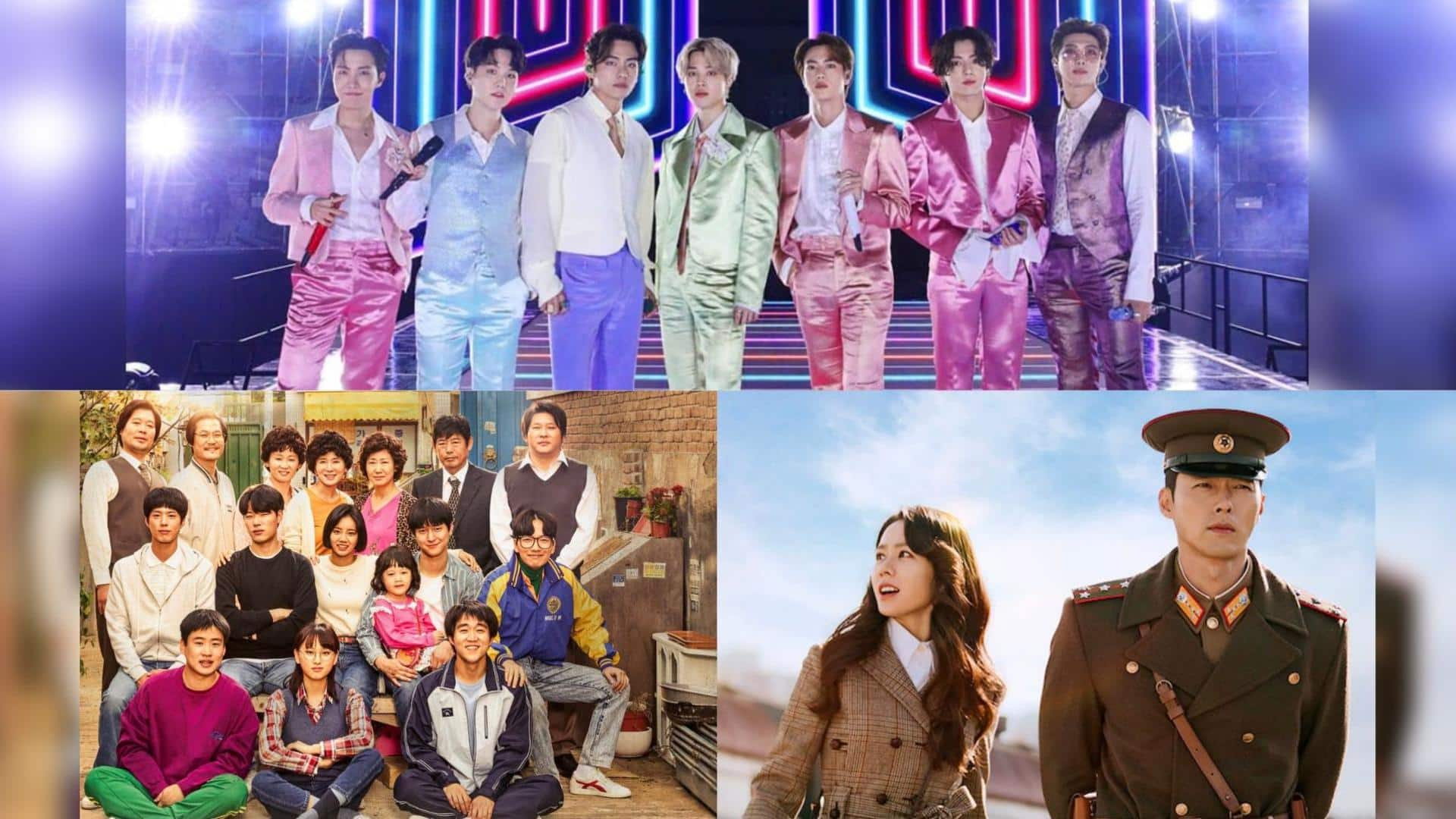
#NewsBytesExplainer: How K-dramas, K-pop sparked interest in learning Korean language
What's the story
South Korea has emerged as an international cultural juggernaut. From the infectious beats of PSY's Gangnam Style to the gripping story of the Academy Award-winning film Parasite, coupled with the global phenomena of the K-pop group BTS, all this has fueled a deep curiosity about Korean culture and especially, language. Let's decode how K-dramas and K-pop have inspired enthusiasts into learning Korean.
Reason
But, why does anyone watching K-dramas want to learn Korean?
As viewers become emotionally invested in the characters' journeys, the desire to better understand the dialogues intensifies. This motivates many to learn Korean. For instance, immensely popular drama Crash Landing on You captivated audiences worldwide with its cross-border love story, prompting fans to further explore the language to better understand the heartfelt dialogues shared between the leads, played by Son Ye-jin and Hyun Bin.
Revolutionizing
K-pop has played a vital role in popularizing Korean language
Not only K-drama, but K-pop—which has been characterized by its energetic beats and vibrant choreography—has also contributed immensely to sparking the interest in Korean language. For instance, ARMYs refer to the member of the worldwide famous BTS group, Jungkook as the "golden maknae." Here, maknae means youngest. Aegyo (acting cute) is another word that has come into the popular culture of K-pop fans.
Popularity
26 Korean words were added to Oxford dictionary
Korean influence transcended boundaries and reached the esteemed Oxford English Dictionary (OED). OED added 26 new words of Korean origin to its 2021 edition—a testament to the increasing influence of the Korean wave. OED embraced words that encapsulate the essence of K-pop culture. Words like Hallyu, K-drama, Manhwa, and Mukbang found their way into the dictionary, highlighting the widespread impact of K-pop culture globally.
Data points
K-drama popularity spurred more Indians to learn Korean, says Duolingo
According to Duolingo's (language learning application) 2023 report, Korean has become the fastest-growing language on their platform, ranking fourth among the top languages Indians are learning. Duolingo revealed that people, particularly from regions like Bihar, Madhya Pradesh, Maharashtra, and West Bengal are engaged in this trend. Moreover, Korean has also gained traction as the most-studied foreign language in the Philippines, Thailand, Indonesia, and Pakistan.
Report
US State Department lists Korean as a 'super hard language'
The popularity of Korean entertainment has had a notable impact in the US, too. According to a CNN report, the number of students enrolled in Korean classes at US higher education institutions nearly tripled from 2012 to 2016, coinciding with the global fascination with Korean entertainment. Despite Korean being classified as a "super-hard language" for English speakers, this data further signifies its growing popularity.
Did you know?
When foreign show titles carried popular Korean words like 'jagiya'
In 2017, GMA Network produced the drama series My Korean Jagiya, which marked the first Philippine TV drama series to be filmed in Seoul, South Korea. The title of the series incorporated the word jagiya, a Korean term used to refer to a lover, akin to terms like babe or honey. This is one shining example of the growing fascination with the Korean language.
Famous shows
'Oppa,' 'Gamsahamnida': Which words have you learned from famous K-dramas?
Words like oppa, which can mean "brother" or a "romantic interest," have gained popularity and are frequently searched on Google due to their usage in popular K-dramas like Hometown Cha-Cha-Cha and What's Wrong With Secretary Kim? Similarly, words like gamsahamnida (thank you) and annyeonghaseyo (hello), featured in K-dramas such as Descendants of the Sun and Good Doctor, have also been widely searched by viewers.
Suggestions
5 Korean words, phrases that every K-Drama fan should know!
If you're an avid K-drama fan, you might be introduced to some common phrases that frequently appear in shows, including Ga-ji-ma, which translates to "don't go," sa-rang-hae (I love you), yak-sohk-hae (promise me), and jo-ah-hae (I like you). By learning these words, you may find yourself becoming less reliant on subtitles. Imagine the satisfaction of understanding your favorite shows without the support of translations!